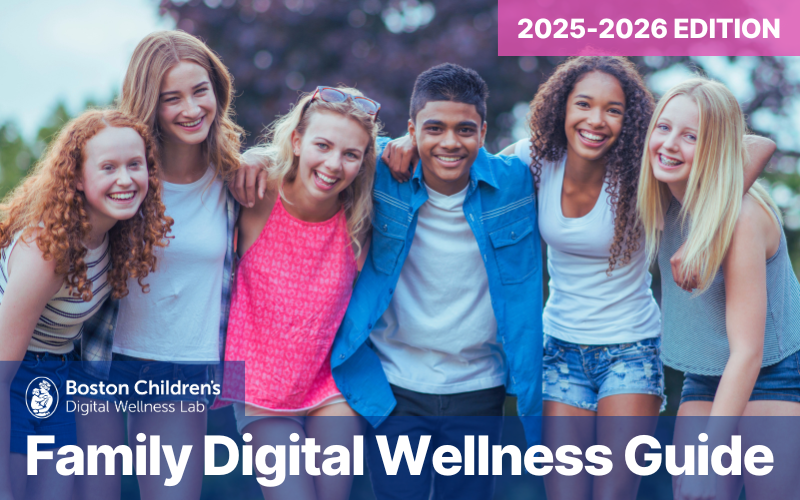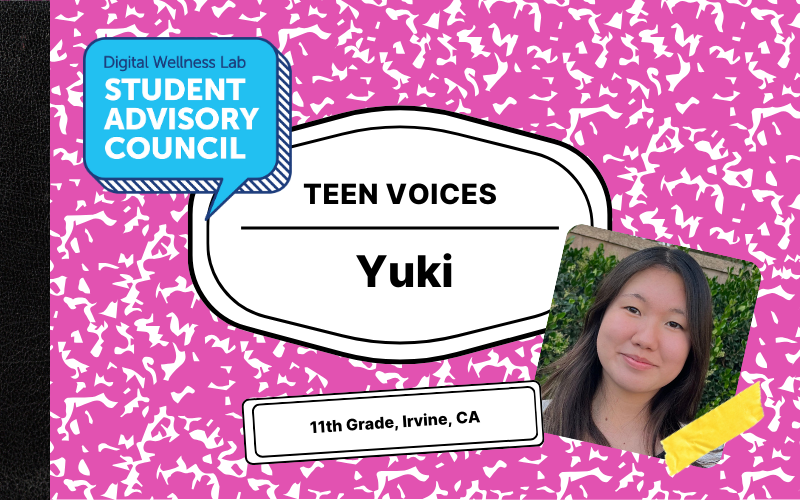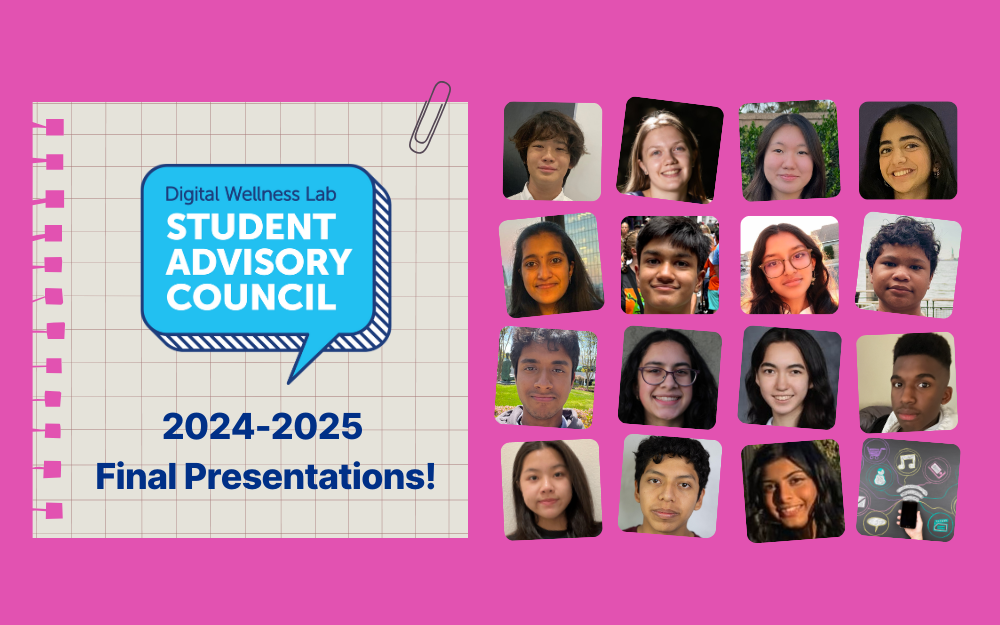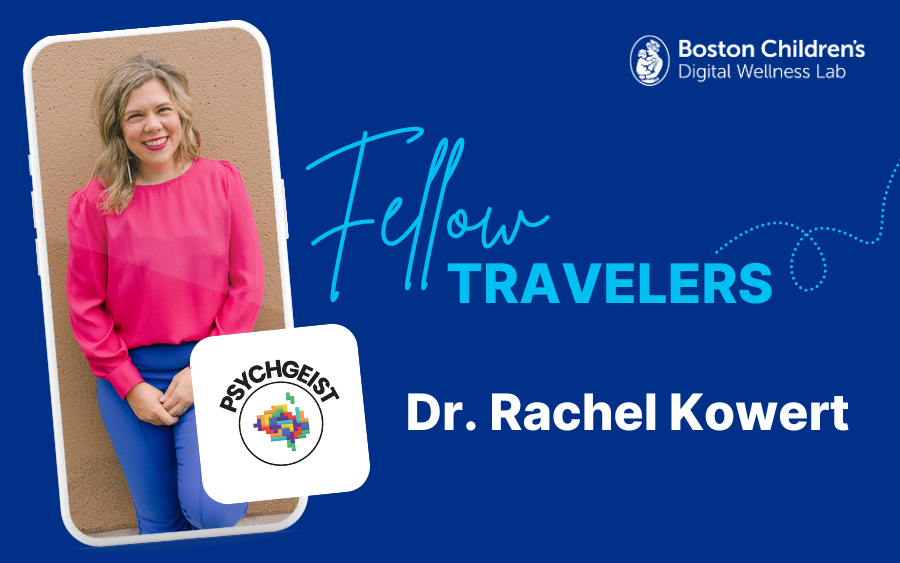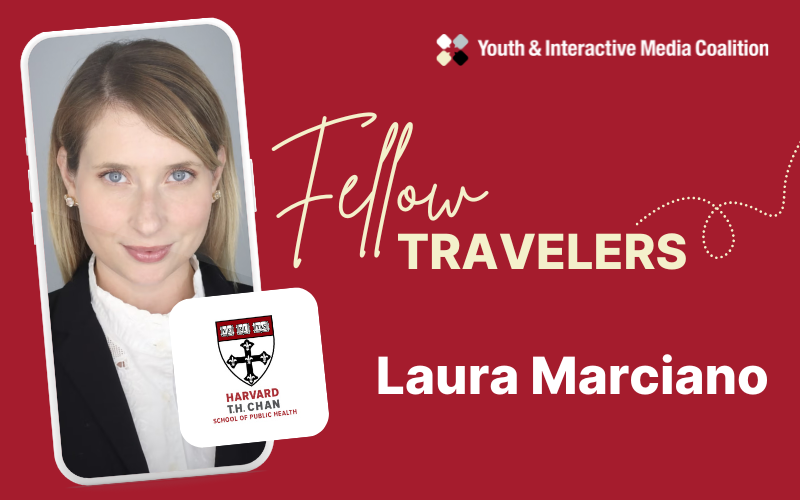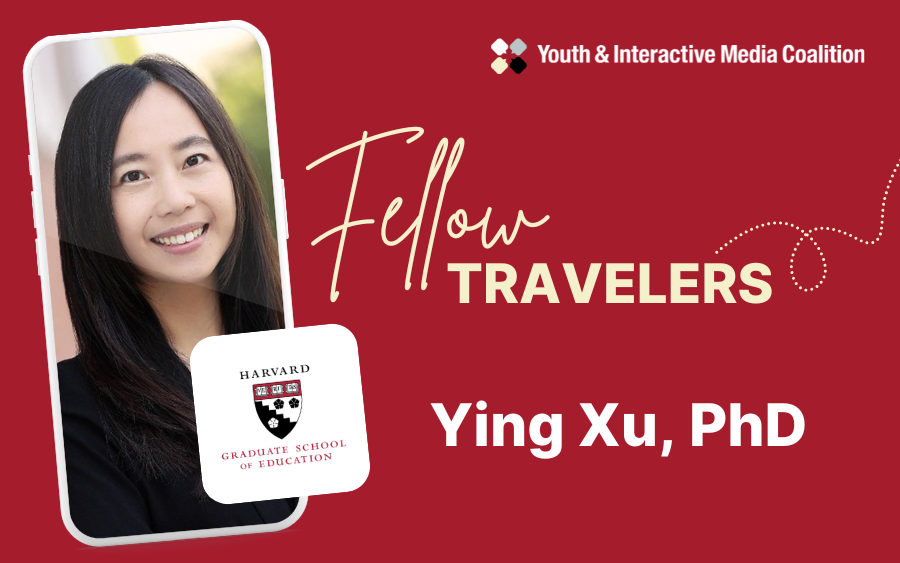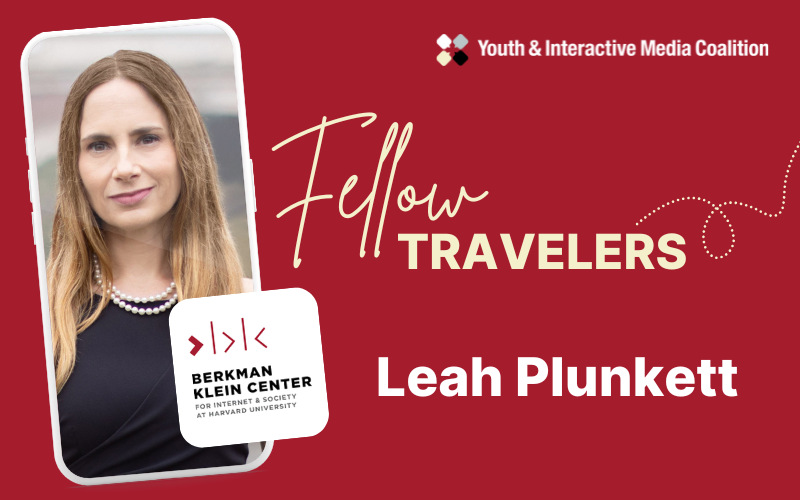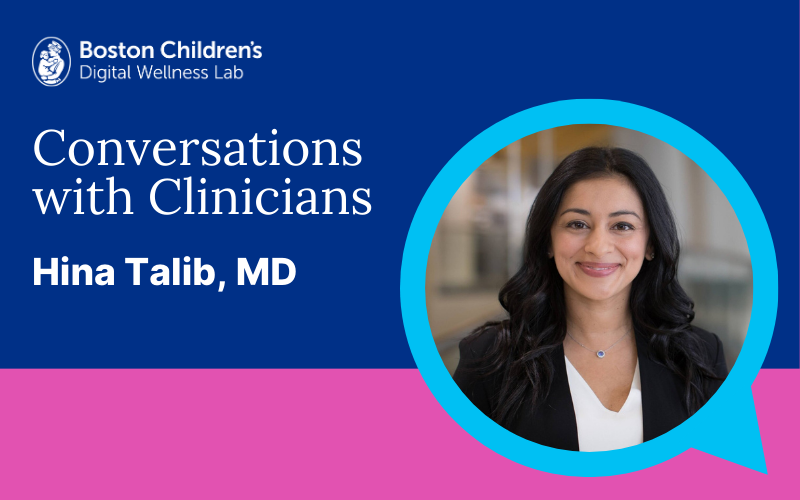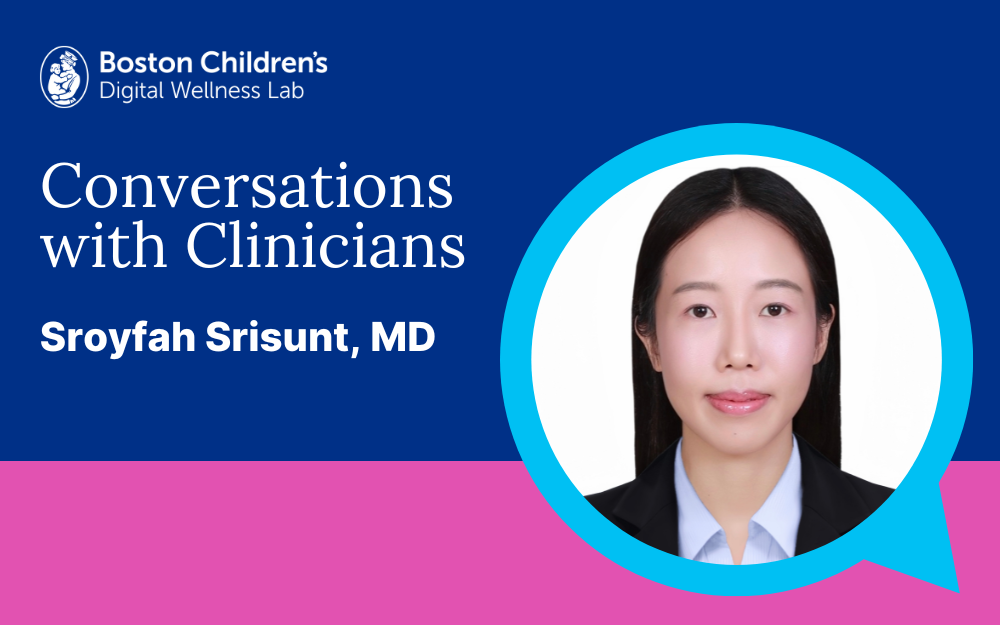Whether it’s schools weighing cell phone bans or families figuring out how AI fits into their kids’ lives, the digital world is always changing, and our work at the Digital Wellness Lab is evolving with it.
This spring, we released new research on teens’ perspectives on cell phone bans in schools, shared fresh insights about how technology can support social-emotional learning, and brought our findings to global stages from here in Boston to Iceland, Italy, Japan and the ancient cities of Greece. We also welcomed new faces to the team, launched impactful resources for families, and connected with fellow researchers, clinicians, and tech innovators all striving for a healthier digital future.
Catch up on our biggest moments and explore new tools, research, and reflections from Q2 2025
Q2 Highlights
Research
- Released our latest Pulse Survey, Fairness and Focus: Teens Weigh in on School Phone Policies, sharing insights from more than 1,500 teens nationwide, with key findings and actionable recommendation..Drawing on these findings we highlight key takeaways about students’ perceptions of safety, teacher relationships, and self-management efforts, and offer guidance to support young people in navigating school phone policies and building their own digital wellbeing.
- Released a new research brief Digital Media and Technology for Social-Emotional Learning (SEL) exploring how technology and media can support SEL across developmental stages. A key takeaway: digital platforms and tools are ripe for embedding SEL opportunities—an untapped potential for tech and media companies that can scale and amplify the pace of learning for young people globally.
- As part of an ongoing long-form research study, our team conducted a series of focus groups in schools across the Greater Boston area to explore the nuanced ways social media and online communication impact adolescents’ lives, developing a more complete picture of teens’ digital experiences that goes beyond statistics to capture authentic stories and perspectives.
Initiatives
- Wrapped up the 2024-2025 Student Advisory Council with dynamic presentations focused on driving positive change in the digital landscape. Topics included mindful media use, bias in AI and platform settings and tools from a perspective of wellbeing.
- Published the inaugural Inspired Internet Pledge Annual Report, representing a year and a half of bold ideas, meaningful collaboration, and collective action.
- Contributed to a new visual resource, (Me)dia Mindfulness, designed for families seeking guidance on raising young people in a digitally saturated world.
- Members of the Youth & Interactive Media Coalition at Harvard University met to discuss current projects and collaboration activities and to finalize plans for a July symposium to develop recommendations for AI guardrails for young children.
Team & Culture
- Extended a warm welcome to our summer interns, Wren Opperman and Abbie Schwartz! Over the next few months, they’ll be working closely with our team as we launch new studies, analyze data, and share key findings.
Presentations, Summits & Conferences
- At the Society for Research in Child Development (SRCD) 2025 Meeting, Dr. Zhiying (Zoey) Yue and Dr. David Bickham presented about AI-powered tools for children and AI-powered voice assistants and children’s social-emotional learning, and Hannah Chidekel led a poster presentation on social media reporting.
- During the 2025 Teton Youth Mental Health Summit, Nicole Powell and Hannah Chidekel piloted youth-centered workshops to empower young people to better understand their online experiences, build digital resilience, and take actionable steps to support their own, and that of their peers, mental health.
- Supported by Dr. Michael Carter, Katrina Ho and Kaitlin Tiches, Hannah Chidekel and Nicole Powell led a workshop session for young people during the Massachusetts Governor Council’s Healthy Youth Summit. As part of a collaboration with Lieutenant Governor Kim Driscoll, the focus was on developing practical tools for high school students to build healthy relationships, both online and offline.
- At the Youth Leaders Summit at Bentley University, Dr. Michael Carter, Katrina Ho, and Zoë Kronberg led interactive sessions with teens on social media and the impact on mental health.
- Cori Stott spoke at the Boston Children’s Hospital League Spring Open Meeting on the influence of digital media on children’s mental and social wellbeing, sharing tips for navigating tech conversations with kids of all ages.
- During the annual International Communication Association (ICA) Conference Dr. Zhiying (Zoey) Yue and Dr. Michael Carter joined a global gathering of scholars, engaging with cutting-edge research across diverse communication topics—from AI’s influence to mobile phones and social media.
- Kaitlin Tiches attended the 2025 Games for Change Festival at Parsons School of Design in New York City, where the “Designing for Tomorrow” theme explored how games and XR can drive measurable impact for education, health, and wellbeing.
- Sam Schwamm, Dr. David Bickham, and Cori Stott attended the PAX East gaming conference to engage with game developers and share about the Lab’s research work in this area.
- Dr. Michael Rich and Kathy Cooney presented a Boston Children’s CME course to medical students on problematic media use, identification, and interventions.
- Kaitlin Tiches attended the Medical Library Association Conference presenting her work on the creation and impact of the Lab’s Research Briefs to highlight how medical librarians can support organizational outreach efforts by providing concise and accessible materials.
- Our partner research team from the University of Washington presented our collaborative paper on “Understanding Children’s Avatar Making in Social Online Games” at the Chi Conference in Japan.
- Lab Research Associate, Dr. Laura Marciano discussed happiness and purpose in the digital age at the inaugural Digital Detox Festival in Italy.
- At The Lyceum Project’s Annual Forum at the Athens Conservatoire in Greece, Dr. David Bickham spoke on multiple panels, sharing the Lab’s research focused on the high-priority issue of enabling children, as tomorrow’s citizens, to flourish in the age of AI.
- At the Aspen Ideas Festival in Colorado, Dr. Michael Rich and Cori Stott shared the Lab’s research and clinical insights with some of the brightest minds and leading voices tackling the world’s most pressing challenges.
- At the Interaction Design and Children (IDC) Conference at Reykjavík University in Iceland, Brinleigh Murphy-Reuter and Kaitlin Tiches led a workshop within the “Designing AI for Children’s Wellbeing” segment, aiming to foster interdisciplinary collaboration for future research and practice in AI technologies that prioritize children’s wellbeing.
The Lab in the News
Approaching screen time with nuance
Discussions around children’s screen time often lean towards an all-or-nothing perspective. However, Dr. Michael Rich, pediatrician and founder of the Digital Wellness Lab, advocates for a more nuanced approach. He joined Andrew Bracken from the Screen Time podcast at KPBS to share practical tips for families seeking to achieve a balanced and thoughtful relationship with screens.
Could podcasts fix screen time woes for children?
In an EdSurge article, Lab Medical Librarian Kaitlin Tiches was featured as an expert, arguing for a shift in focus from screen time duration to the nature of the content itself. “I think because screen time, or screens in general, have reached this saturation point where they are everywhere, we need to look beyond how much time we clock staring at a screen and think what we’re doing with them,” she says, adding that, for a child, an hour of screen time staring at a fast-paced, non-engaging YouTube video is different than an hour of watching Sesame Street while getting up to dance along.
How young is too young? No such thing apparently
Dr. Rich sat down with the Harvard Gazette to discuss evidence-based perspectives on screen time from infancy through adolescence and to offer practical wisdom for families navigating our digital world. He emphasizes that “ultimately, whether we’re talking about television or smartphones or Gen AI, our goal is to help kids be critical thinkers, to be digitally literate in what they receive and also what they create and put out there.”
How to raise healthy kids in a screen-saturated world
In this episode of Nourished with Nora, health advocate Nora LaTorre talks with Dr. Rich about how screen time affects child development, mental health, sleep, learning, and family dynamics. Dr. Rich, known as the “Mediatrician,” shares science-backed insights into the impact of digital media on kids and offers simple, practical tools for raising healthier, happier, more resilient children in a tech-driven world.
Digital lives: finding balance
Many young people spend hours daily online, creating digital footprints that impact their mental health both positively and negatively. In this parent-focused article from Harvard Health’s Mindscape magazine, The Digital Wellness Lab’s Family Digital Wellness Guide and 5 Ms of Digital Wellness are cited as valuable resources.
How to promote kids’ digital wellness
How do we help kids not just survive, but thrive in a digital environment? Dr. Rich tackled this question on the Talking About Kids podcast, sharing insights from his book The Mediatrician’s Guide.
The key shift? Moving beyond protecting kids from digital harm to empowering them with essential skills: awareness, critical thinking, creativity, and empathy. These tools help young people harness screen media’s benefits while avoiding its pitfalls.
Recommended Reads From Our Fellow Travelers
Movement and Outdoor Activity Family Guide California Partners Project
Youth Voice Playbook Center for Digital Thriving
Frontiers in Digital Child Safety Berkman Klein Center for Internet & Society
Backseat Book Crew with Josh Gad Amazon Kids
The Mediatrician’s #1 Rule for Tech and Kids (It’s Not What You Think) Parent ProTech
The Nature Remedy: Find Freedom from Tech Overload mindful magazine
Violent Media, Toxic Online Spaces, and Youth Aggression Children & Screens Ask the Experts Webinar
Tackling the Youth Mental Health Crisis: Why Every Child Needs a Trusted Adult The 74 Media
What Teens Are Saying About AI – Right Now Center for Digital Thriving
Wired and Tired: Defining Digital Tension Young Futures
Resources for Families
Teen Voices
Teen Voices: Yuki
Yuki, a member of the Digital Wellness Lab’s 2024-2025 Student Advisory Council, shares how balancing openness with guidance is crucial for fostering healthy digital habits for teens.
Teen Voices Shaping a Healthier Digital World: Highlights from the Digital Wellness Lab’s 2024-2025 Student Advisory Council Presentations
The Digital Wellness Lab convened its 2024-2025 Student Advisory Council, a dynamic group of 17 high school students from around the United States, for their year-end presentations
Fellow Travelers
Fellow Travelers: Dr. Rachel Kowert
As the founder of Psychgeist, Dr. Rachel Kowert, reframes the conversation from negativity and parental guilt, and emphasizes that video games and all digital media can be tools for parents and young people to interact with technology safely and responsibly.
Fellow Travelers: Laura Marciano, PhD
Dr. Laura Marciano, a research associate at the Harvard T.H. Chan School of Public Health, understands the importance of teens’ unique experiences and makes direct conversation and engagement a crucial preliminary step in her research process.
Fellow Travelers: Ying Xu, PhD
Dr. Ying Xu, Assistant Professor of Education at the Harvard Graduate School of Education, shares more about her research on designing AI technologies that promote language and literacy development, and wellbeing for children and families.
Fellow Travelers: Leah Plunkett, JD
Leah Plunkett, Faculty Associate at the Berkman Klein Center for Internet & Society at Harvard University, discusses the critical importance of protecting digital privacy for kids, and how thoughtful design and product choices can positively impact their online environments.
Conversations With Clinicians
Conversations with Clinicians: Hina Talib, MD
Teen health advocate Dr. Hina Talib encourages families to talk openly with their pediatricians about digital wellness as having these conversations can keep kids safe in all spaces.
Conversations with Clinicians: Sroyfah Srisunt, MD
Visiting pediatrician from Thailand, Dr. Sroyfah Srisunt, explains how children can thoughtfully navigate digital environments, safely navigate risks, learn from setbacks, and develop resilience in the digital world.
Want More?
To catch up on what else we’ve been up to at the Digital Wellness Lab, check out our latest blog posts and press; learn more about our work and how we create impact here; and if you haven’t already, be sure to sign up for our monthly newsletter.
Interested in learning more about joining the Inspired Internet Pledge to be a part of the collaborative work to build a healthier internet? Email us at dwl@childrens.harvard.edu to connect!







